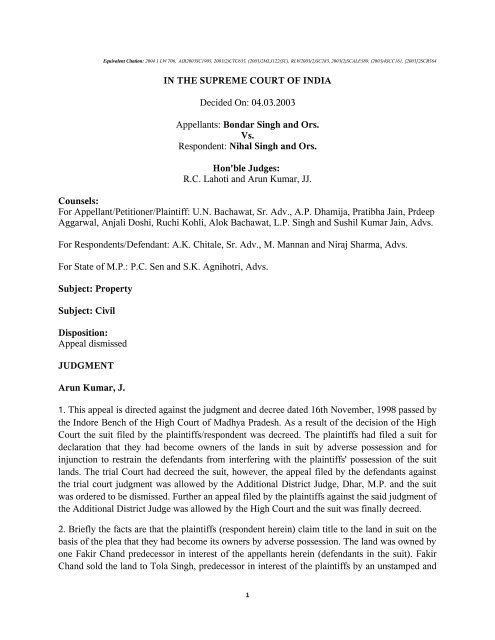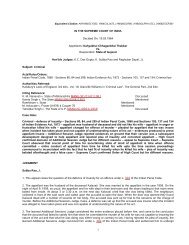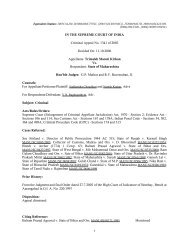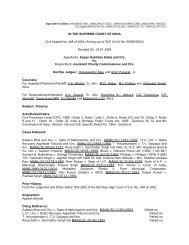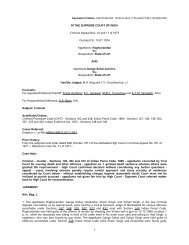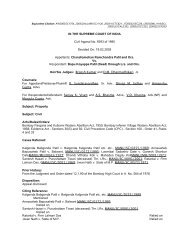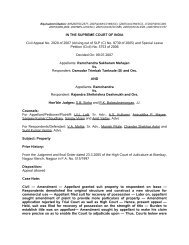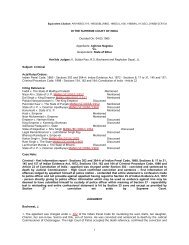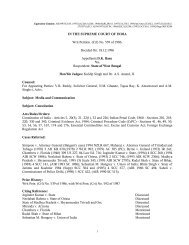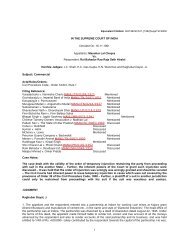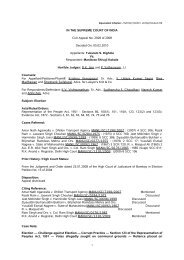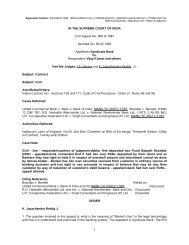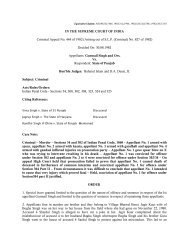Bondar Singh and Ors-vs
Bondar Singh and Ors-vs
Bondar Singh and Ors-vs
Create successful ePaper yourself
Turn your PDF publications into a flip-book with our unique Google optimized e-Paper software.
Equivalent Citation: 2004 1 LW 706, AIR2003SC1905, 2003(2)CTC635, (2003)2MLJ122(SC), RLW2003(2)SC283, 2003(2)SCALE589, (2003)4SCC161, [2003]2SCR564<br />
IN THE SUPREME COURT OF INDIA<br />
Decided On: 04.03.2003<br />
Appellants: <strong>Bondar</strong> <strong>Singh</strong> <strong>and</strong> <strong>Ors</strong>.<br />
Vs.<br />
Respondent: Nihal <strong>Singh</strong> <strong>and</strong> <strong>Ors</strong>.<br />
Hon'ble Judges:<br />
R.C. Lahoti <strong>and</strong> Arun Kumar, JJ.<br />
Counsels:<br />
For Appellant/Petitioner/Plaintiff: U.N. Bachawat, Sr. Adv., A.P. Dhamija, Pratibha Jain, Prdeep<br />
Aggarwal, Anjali Doshi, Ruchi Kohli, Alok Bachawat, L.P. <strong>Singh</strong> <strong>and</strong> Sushil Kumar Jain, Ad<strong>vs</strong>.<br />
For Respondents/Defendant: A.K. Chitale, Sr. Adv., M. Mannan <strong>and</strong> Niraj Sharma, Ad<strong>vs</strong>.<br />
For State of M.P.: P.C. Sen <strong>and</strong> S.K. Agnihotri, Ad<strong>vs</strong>.<br />
Subject: Property<br />
Subject: Civil<br />
Disposition:<br />
Appeal dismissed<br />
JUDGMENT<br />
Arun Kumar, J.<br />
1. This appeal is directed against the judgment <strong>and</strong> decree dated 16th November, 1998 passed by<br />
the Indore Bench of the High Court of Madhya Pradesh. As a result of the decision of the High<br />
Court the suit filed by the plaintiffs/respondent was decreed. The plaintiffs had filed a suit for<br />
declaration that they had become owners of the l<strong>and</strong>s in suit by adverse possession <strong>and</strong> for<br />
injunction to restrain the defendants from interfering with the plaintiffs' possession of the suit<br />
l<strong>and</strong>s. The trial Court had decreed the suit, however, the appeal filed by the defendants against<br />
the trial court judgment was allowed by the Additional District Judge, Dhar, M.P. <strong>and</strong> the suit<br />
was ordered to be dismissed. Further an appeal filed by the plaintiffs against the said judgment of<br />
the Additional District Judge was allowed by the High Court <strong>and</strong> the suit was finally decreed.<br />
2. Briefly the facts are that the plaintiffs (respondent herein) claim title to the l<strong>and</strong> in suit on the<br />
basis of the plea that they had become its owners by adverse possession. The l<strong>and</strong> was owned by<br />
one Fakir Ch<strong>and</strong> predecessor in interest of the appellants herein (defendants in the suit). Fakir<br />
Ch<strong>and</strong> sold the l<strong>and</strong> to Tola <strong>Singh</strong>, predecessor in interest of the plaintiffs by an unstamped <strong>and</strong><br />
1
unregistered sale deed dated 9.5.1931. The plaintiffs claim to have entered into possession of the<br />
l<strong>and</strong> on the basis of the said sale deed <strong>and</strong> they claim to be continuously in possession since then.<br />
The defendants tried to dispossess the plaintiffs which led to the present suit being filed by them<br />
on 15.4.1972. In the written statement filed by the defendants they denied the sale of l<strong>and</strong> by<br />
their father Fakir Ch<strong>and</strong> to Tola <strong>Singh</strong>. They denied possession of the plaintiffs of the suit l<strong>and</strong>.<br />
They also took the plea that the alleged deed was false, fictitious <strong>and</strong> without consideration.<br />
According to the defendants, their father was in possession of the l<strong>and</strong>s till his death. After the<br />
death of their father, their mother had given possession of the l<strong>and</strong> to Tola <strong>Singh</strong> for purpose of<br />
cultivation in order to earn some money for supporting her family. According to the defendants<br />
they had taken back possession of the l<strong>and</strong> from Tola <strong>Singh</strong> in the year 1957-58. They also<br />
pleaded that after the death of Fakir Ch<strong>and</strong>, the l<strong>and</strong> had been mutated in their names in the<br />
revenue records to the knowledge of the plaintiffs. The plea of adverse possession was denied by<br />
stating that actually the defendants were in possession of the l<strong>and</strong> <strong>and</strong> there was no question of<br />
adverse possession of the l<strong>and</strong> by the plaintiffs qua the suit l<strong>and</strong>.<br />
3. The main question for consideration in the present suit is as to whether the plaintiffs were in<br />
hostile continuous possession of the suit l<strong>and</strong>s by virtue of which they had perfected their title to<br />
the l<strong>and</strong> by adverse possession. Both parties claim to be in possession of the suit l<strong>and</strong>. While<br />
considering the above question, the Court will also have to look into the plea raised by the<br />
learned counsel for the appellants/defendants that the plaintiffs had come in possession of the<br />
suit l<strong>and</strong> for a brief period after the death of Fakir Ch<strong>and</strong>, father of the defendant as "Shikmi"<br />
that is sub-tenants. The plea of sub-tenancy was as such not raised in the written statement nor<br />
any issue was framed by the trial Court in this connection. No particulars of alleged sub-lease<br />
were given. Not even date of creation of alleged sub-lease was stated. The defendants have tried<br />
to build an argument based on plea of sub tenancy (shikmi) at appellate stage. In support of this<br />
plea they rely on certain entries in the revenue records. Since this plea pre-supposes possession<br />
of the plaintiffs, the defendants took the st<strong>and</strong> that they had taken back the possession of the l<strong>and</strong><br />
from the defendants.<br />
4. Before we proceed further it is necessary to notice a preliminary argument raised by the<br />
learned counsel for the appellants. It was contended that the question of possession is a question<br />
of fact <strong>and</strong> the High Court while exercising power under Section 100 of the Code of Civil<br />
Procedure, had no jurisdiction to upset the findings on this question recorded by the lower<br />
appellate Court. An appeal under Section 100 C.P.C. can be entertained by the High Court only<br />
on a substantial question of law. There can be no quarrel with this legal proposition. The scope<br />
of powers of High Court under Section 100 C.P.C. is a matter of settled law. The learned counsel<br />
for the appellant cited several judgments in support of his contention. We do not consider it<br />
necessary to discuss these decisions because so far as the question of powers of High Courts<br />
under Section 100 C.P.C. is concerned, it needs no discussion. If the findings of the subordinate<br />
courts on facts are contrary to evidence on record <strong>and</strong> are perverse, such finding can be set aside<br />
by the High Court in appeal under Section 100 C.P.C. A High Court cannot shut its eyes to<br />
perverse findings of the courts below. In the present case the findings of fact arrived at by the<br />
lower appellate court were contrary to evidence on record <strong>and</strong>, therefore, perverse <strong>and</strong> the High<br />
Court was fully justified in setting aside the same resulting in the appeal being allowed <strong>and</strong> suit<br />
being decreed.<br />
2
5. The main question as we have already noted is the question of continuous possession of the<br />
plaintiffs over the suit l<strong>and</strong>s. The sale deed dated 9.5.1931 by Fakir Ch<strong>and</strong>, father of the<br />
defendants in favour of Tola <strong>Singh</strong>, the predecessor interest of the plaintiff, is an admitted<br />
document in the sense its execution is not in dispute. The only defence set up against said<br />
document is that it is unstamped <strong>and</strong> unregistered <strong>and</strong> therefore it cannot convey title to the l<strong>and</strong><br />
in favour of plaintiffs. Under the law a sale deed is required to be properly stamped <strong>and</strong><br />
registered before it can convey title to the vendee. However, legal position is clear law that a<br />
document like the sale deed in the present case, even though not admissible in evidence, can be<br />
looked into for collateral purposes. In the present case the collateral purpose to be seen is the<br />
nature of possession of the plaintiffs over the suit l<strong>and</strong>. The sale deed in question at least shows<br />
that initial possession of the plaintiffs over the suit l<strong>and</strong> was not illegal or unauthorized. It is<br />
significant to note that the sale deed is dated 9.5.1931 <strong>and</strong> Fakir Ch<strong>and</strong> died somewhere in the<br />
year 1949-50. During his lifetime Fakir Ch<strong>and</strong> never disputed plaintiffs' title or possession of the<br />
suit l<strong>and</strong>. There is other reliable evidence on record which establishes that the plaintiffs have<br />
been in continuous possession of the l<strong>and</strong> in question. There is a notice dated 16.4.1956 Exhibit<br />
P.6. The notice was issued on behalf of the defendants <strong>and</strong> is addressed to the predecessor<br />
interest of the plaintiffs. By the notice the defendants called upon the plaintiffs to h<strong>and</strong> over<br />
possession of the suit l<strong>and</strong> to them. According to the notice, the plaintiffs were trespassers on the<br />
suit l<strong>and</strong> <strong>and</strong> were liable to h<strong>and</strong> over its possession to the defendants. This notice is an<br />
admission on the part of the defendants that the plaintiffs were in possession of the suit l<strong>and</strong> at<br />
least on the date of the notice i.e. 16 th April, 1956. The notice was followed by an application<br />
dated 8 th May, 1956 (Exhibit P.3) filed by the defendants under Section 58 of the Madhya Bharat<br />
L<strong>and</strong> Revenue <strong>and</strong> Tenancy Act, 1950 before the revenue authorities. In the said application the<br />
defendants admit that the l<strong>and</strong> in question was in possession of the plaintiffs since the lifetime of<br />
their father. It is further admitted that the l<strong>and</strong> was being cultivated by the plaintiffs. It was<br />
prayed in the said application that the plaintiffs be declared trespassers over the suit l<strong>and</strong> <strong>and</strong><br />
possession of the l<strong>and</strong> be given to the defendants. In their reply to the application, the present<br />
plaintiffs denied the allegation that they were trespassers on the suit l<strong>and</strong>, they refer to the sale<br />
deed of 9.5.1931 by Fakir Ch<strong>and</strong> in favour of their predecessor. Thus the plaintiff were all along<br />
asserting that they were in possession of the l<strong>and</strong> in their own right. The Tehsildar vide his order<br />
dated 3 rd October, 1959 dismissed the said application of the defendants. He relied on an<br />
admission on the part of the Poonam Ch<strong>and</strong>, eldest son of Fakir Ch<strong>and</strong> that the present plaintiffs<br />
were in possession for the last 26-27 years. Relying on the said statement the revenue authorities<br />
held that since possession of the present plaintiffs was continuing for last 25-27 years they could<br />
not be dispossessed from the suit l<strong>and</strong>. The application of the defendants was dismissed. The<br />
defendant filed an appeal against the said order which was also dismissed on 6.8.1962. A copy of<br />
the order of the Tehsildar is Exhibit P.8 while a copy of the order of the appellate authority i.e.<br />
S.D.O. is Exhibit P.9. These judgments of the revenue authorities establish that at least till 1962<br />
the plaintiffs were in possession of the suit l<strong>and</strong>. They also totally nullify the assertion of the<br />
defendants in their written statement in the present suit that they had taken possession of the suit<br />
l<strong>and</strong> in 1957-58. If they had taken possession of the suit l<strong>and</strong> in 1957-58 why were they pursing<br />
the matter before the revenue authority till 1962 when the appeal was contested before the<br />
S.D.O. <strong>and</strong> the decision of the S.D.O. was given on 6.8.1962?<br />
6. It appears that having failed to obtain possession of the suit l<strong>and</strong> through lawful means, the<br />
defendants tried to dispossess the plaintiffs forcibly which led to the present suit being filed on<br />
15.4.1972. The claim of the defendants regarding taking possession of suit l<strong>and</strong> from plaintiffs in<br />
1957-58 having been found to be false, it follows that the defendants never came into possession<br />
3
of the suit l<strong>and</strong>. Another significant conclusion which follows from these facts is that the<br />
defendants started asserting their title to the suit l<strong>and</strong> since at least 1956 when they issued the<br />
notice Exhibit P.6 while the plaintiffs have been denying their title to the suit l<strong>and</strong> <strong>and</strong> were<br />
setting up their own title to the same. This l<strong>and</strong>s support to the plea of adverse possession set up<br />
by the plaintiffs. It will be seen from this clear <strong>and</strong> clinching evidence on record that the<br />
plaintiffs were in continuous <strong>and</strong> uninterrupted possession of the suit l<strong>and</strong> since 1931 <strong>and</strong> they<br />
had been setting up a hostile title thereto as against the defendants. The defendants were<br />
asserting their title to the l<strong>and</strong> since 1956. They had however failed to get possession of the suit<br />
l<strong>and</strong>. The plea of adverse possession raised by the plaintiff is thus clearly established.<br />
7. As regards the plea of sub tenancy (shikmi) argued on behalf of the defendants by their<br />
learned counsel, first we may note that this plea was never taken in the written statement the way<br />
it has been put forth now. The written statement is totally vague <strong>and</strong> lacking in material<br />
particulars on this aspect. There is nothing to support this plea except some alleged revenue<br />
entries. It is settled law that in the absence of a plea no amount of evidence led in relation thereto<br />
can be looked into. Therefore, in the absence of a clear plea regarding sub tenancy (shikmi) the<br />
defendants cannot be allowed to build up a case of sub tenancy (shikmi). Had the defendants<br />
taken such a plea it would have found place as an issue in the suit. We have perused the issues<br />
framed in the suit. There is no issue on the point.<br />
8. The alleged revenue entries relied upon by defendants do not support the plea of the<br />
defendants that the plaintiffs' possession of the l<strong>and</strong> was as shikmi tenants. A significant point<br />
which militates against the argument that the plaintiffs were shikmi tenants on the suit l<strong>and</strong> is<br />
that the mother of the defendants is said to have inducted the plaintiffs as sub-tenants. The<br />
mother of the defendants was alive at the relevant time <strong>and</strong> her evidence on this point would<br />
have been the best evidence. She could have been produced in evidence in support of this plea.<br />
The defendants, rather than producing her in evidence, created a drama by moving an application<br />
for examining their mother as a witness on commission. The trial Court passed an order<br />
appointing a Commissioner to record her evidence on commission. However, when the<br />
Commissioner went to record the evidence of the mother, it was represented to him that she was<br />
totally deaf <strong>and</strong> dumb <strong>and</strong> therefore, the Commissioner returned without recording her statement.<br />
The plaintiffs thereafter moved an application that the mother of the defendants was completely<br />
hale <strong>and</strong> hearty <strong>and</strong> in order to avoid her being cross-examined by the counsel for the plaintiffs<br />
she was purposely not produced as a witness. Apart from this, even Puran Ch<strong>and</strong>, the eldest<br />
brother of the defendants was not examined as a witness. The defendants were said to be very<br />
young at the time of death of their father. Punam Ch<strong>and</strong> is the eldest son of Fakir Ch<strong>and</strong>. He was<br />
also kept away from the court in these proceedings even though he was arrayed as a defendant in<br />
the suit. The written statement filed by the defendants was a joint written statement by all the<br />
defendants except Punam Ch<strong>and</strong>. Punam Ch<strong>and</strong> did not file a written statement. The best<br />
evidence in relation to the plea of shikmi, though available, was kept away from the court. It<br />
follows from the above that the argument that the plaintiffs were shikmi tenants in the suit l<strong>and</strong> is<br />
wholly devoid of any merit. The same has therefore to be rejected.<br />
9. Regarding the plea of the defendants that they had taken possession of the l<strong>and</strong> in suit from the<br />
plaintiffs somewhere in the year 1957 the High Court has aptly remarked that the defendants<br />
were required "to open their mouth before the revenue authorities if not in 1957 at least in the<br />
year 1962 to show to the revenue authorities that they had obtained possession." The High Court<br />
has further found after scrutinizing the record that the defendants did not care to file even a<br />
4
single revenue entry for the period between 1956 <strong>and</strong> 1962 that they had been recorded in<br />
possession of the suit l<strong>and</strong>s. Therefore, the High Court concluded that the finding recorded by<br />
the lower appellate Court was based on surmises <strong>and</strong> conjecture <strong>and</strong> was contrary to the evidence<br />
on record <strong>and</strong> the law. The High Court came to a definite finding that Tola <strong>Singh</strong> predecessor in<br />
interest of the plaintiffs came in possession of the suit l<strong>and</strong> in the year 1931 <strong>and</strong> continued to be<br />
in possession thereof till the date the present suit was filed in 1972.<br />
10. The defendants have tried to take advantage of the fact that a receiver had been appointed<br />
with respect to the suit l<strong>and</strong> in proceedings under Section 145 of the Code of Criminal<br />
Procedure. According to the defendants the possession of the receiver was on their behalf. This is<br />
not correct. The plaintiffs had become bhoomiswami with respect to the suit l<strong>and</strong> prior to the<br />
appointment of the receiver. Therefore, receiver's possession could not be said to be on behalf of<br />
the defendants.<br />
11. The result of the above discussion is that there is no merit in this appeal. The st<strong>and</strong> taken by<br />
the defendants/appellants is totally untenable. The appeal is dismissed leaving the parties to bear<br />
their respective costs.<br />
5


